8 Promotional Emails That Actually Work

Promoting a special offer via email is easily said. After all, what do you need other than a product image and a discount? In reality, it’s not that simple. Each promotional message should be part of a wider strategy for building relationships with the user. It is therefore important to know how to best calibrate the style, language, frequency and creativity of the offers so that they can deliver real results.
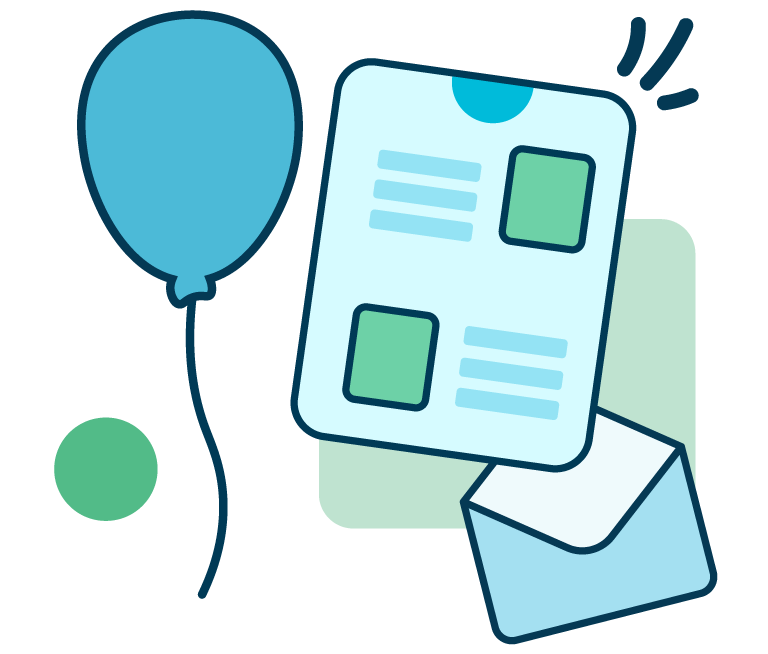
From developing integrations to strategic support, from creating creative concepts to optimizing results.
What are promotional emails anyway?
Promotional emails are messages that are aimed at completing a purchase or making a conversion. They form part of a diverse array of communications within an effective email marketing strategy – so only sending your database emails about discounts is strictly forbidden.
The most effective promotional emails are able to convert the user right away. The reader is accompanied through a persuasive process that is usually quite fast paced, ending with a call-to-action that pushes them to complete the desired action – buying, downloading, signing up to an event, and so on.
The most important factor to keep in mind when creating promotional emails is the relationship with the recipient. Make sure your posts speak positively and openly about your brand, product and values, as well as the history behind that service, and not just the price. You should also take care over the frequency: too many promotional emails can erode the user’s available margins of attention and consideration, turning it into a nuisance rather than a useful service.
When it comes to promotional emails, remember: less is more if you want to avoid problems relating to reputation and deliverability.
How to optimize promotional emails
1. Go beyond the discount
The human psyche is a complex entity. When convincing it to buy a product, the money leverage (savings! more savings!) is just one of the possible options, and oftentimes it is not the most effective. In 1954, US psychologist Abraham Maslow categorized human needs in his famous pyramid. Depending on the type of product, communication strategy and other factors, you can try to play on one of the different levels.
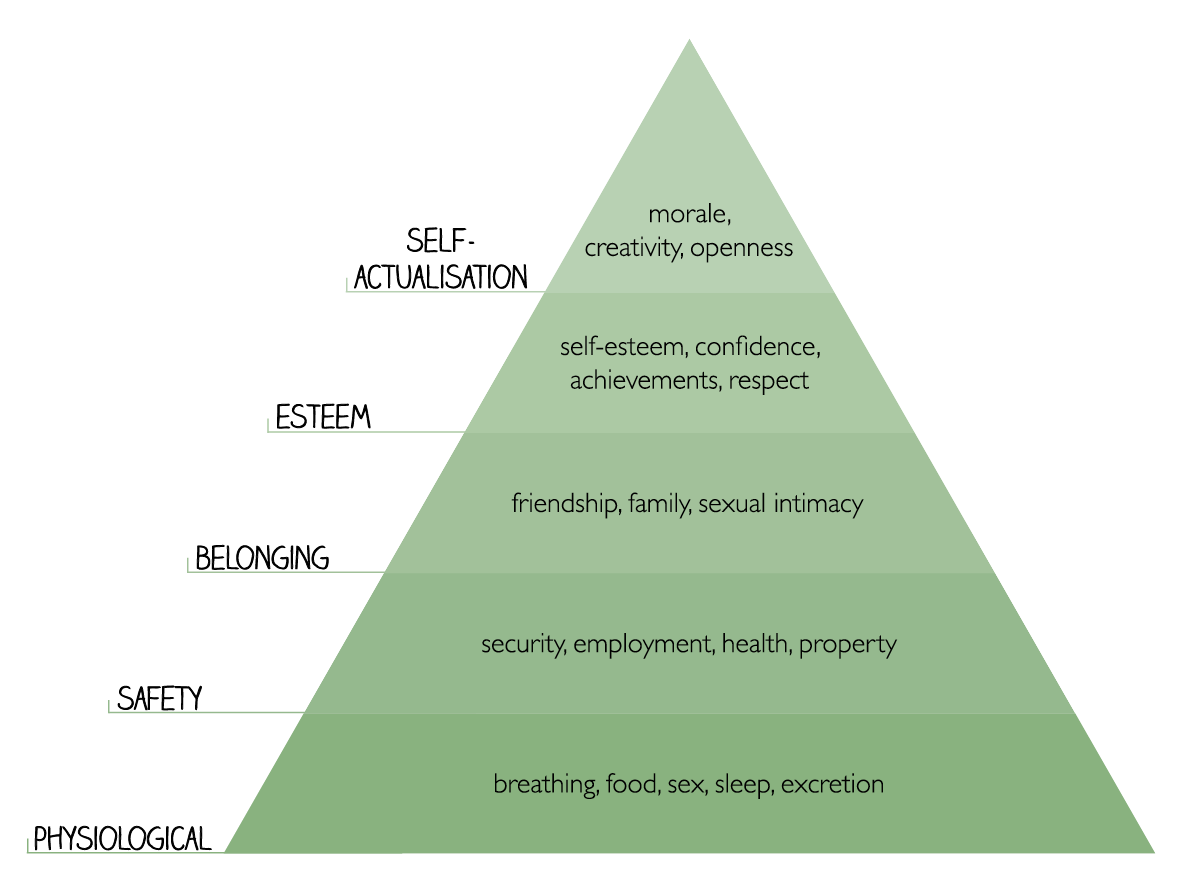
The discount incentive acts on the level of security (the customer feels reassured by safeguarding their economic well-being). For more complex purchasing types, however, it may well be worth striking a different note. For example:
- Products for new moms: work on the third level (need for belonging and intimacy)
- Luxury items: work on the fourth level (need for esteem and success)
- Museums, cultural events, vacations: work on the fifth level (need for self-realization and freedom)
And so on. Obviously, thinking in these terms requires a little more effort than the classic “Everything for -70%” email. But it’s worth it.
2. Target your offers
There is no one communication that fits everyone. Every customer is different, and the communications that reach them should take that uniqueness into account. Here are the two basic steps for email marketing that bring real results:
- Profile your user base. Collect personal, behavioral, purchase and preference information to use as a basis for the differentiated mail-outs.
- Segment your mailings. There is no point in sending a gardening promotion to someone who has only ever purchased electronic products. Cherish the data collected and make sure that every user only receives communications that actually interest them.
3. Experiment with formats
Choosing the right design for emails is critical for ensuring success. Because of this, and to avoid the deja-vu effect caused by templates that are always the same, try to vary the format of your communications:
- Graphic, with beautifully illustrated images and stringed copy. It usually has a lot of sway with a B2C public.
- Textual, with very limited images and a layout similar to the “personal” emails that we write every day with our own words. Preferred by many in B2B contexts.
- Videos or animated GIFs, to add movement and emphasis to the content.
4. Craft compelling subject lines
Th quality of the subject line is essential for ensuring the success of a promotional email campaign. It is very important to do frequent A/B tests. Here are some tips to try out:
- Customization: use dynamic fields to enter the customer’s name and other personalized values in the subject line, and thus increase the propensity to click
- Discount: if the driver of the promotion is the price, announcing it an unequivocal way will increase the chances of people opening the page
- Symbols and emojis: yes, use them, but sparingly. Once in a while they draw attention, but they get tiring after a while.
- How-to’s: knowing your customers means knowing which problems are most likely to concern them – and how your product can come to their aid. An effective solution will see sales soar.
- Fun fact: try a riddle, a clue or a sentence that needs to be completed. If carefully prepared, classic click-bait can work very well.
5. Focus on the CTA
The call-to-action is another key element in determining an email’s click and conversion rates. Experiment often, keeping these basic rules in mind:
- Always choose an HTML button over one in an image. That way you can avoid issues with visualization, even among the most difficult clients.
- Be clear. The call-to-action button must lead the user to carry out the unwanted action, without confusing them.
- Space out the CTAs well. Having many buttons – especially if they indicate several different actions – can prove chaotic. Concentrate the message into a few buttons (or even one) and make them consistent between one another.
8 types of promotional emails to try out today
1. Sales
The most classic type of promotional email is that heralding the discounts par excellence – the summer or winter sales. When the season is right, all you need do is give free rein to your creativity and arose curiosity with captivating, colorful, elegant graphics. Moreover, on the contents side of things, there is only driver of the action and it is not particularly sophisticated – the price.
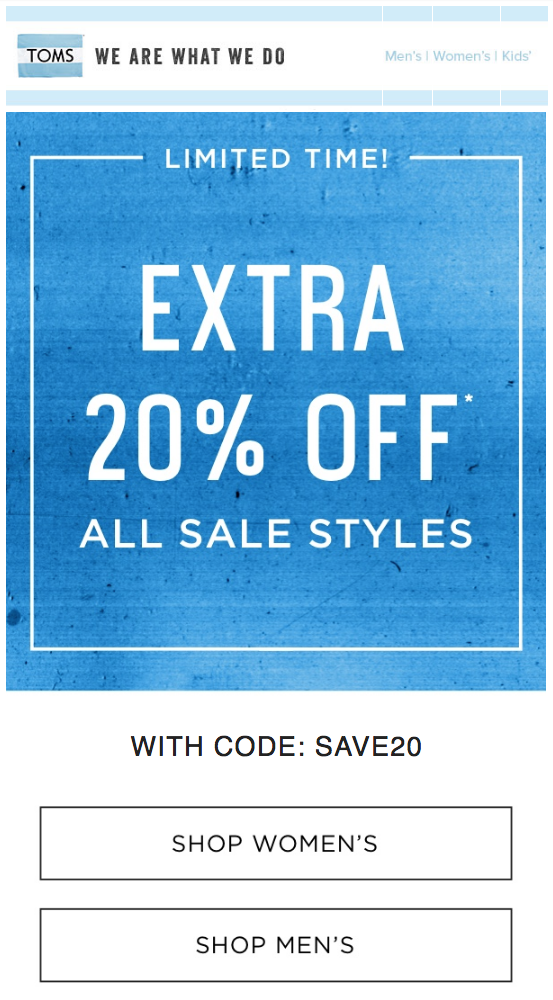
2. Exclusive promotion
One of the most effective leverage points we have include is that of exclusivity. The feeling of being part of a small group of privileged people has a strong appeal for human psychology. Open the way to mobile-only, newsletter-only, member-only or friends & family promos – just like this one from Julep.
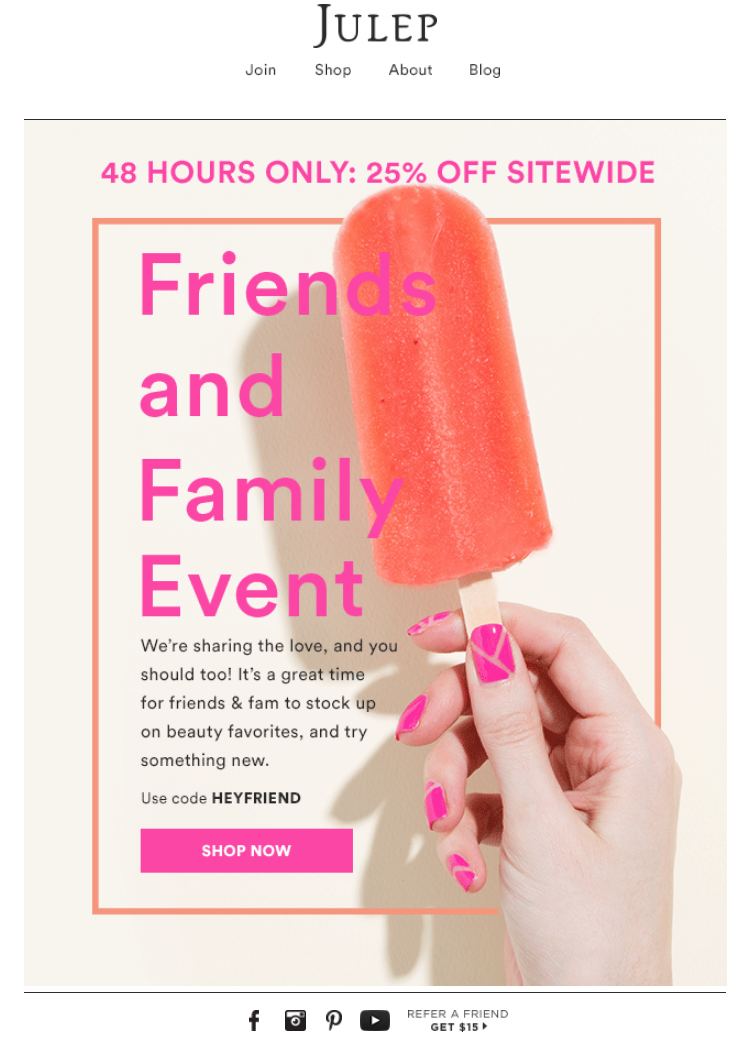
3. Limited time offer
The acronym FOMO (fear of missing out) perfectly summarizes the psychological leverage that makes limited time offers so irresistible for potential customers. What better than an animated countdown timer to instill a sense of urgency?
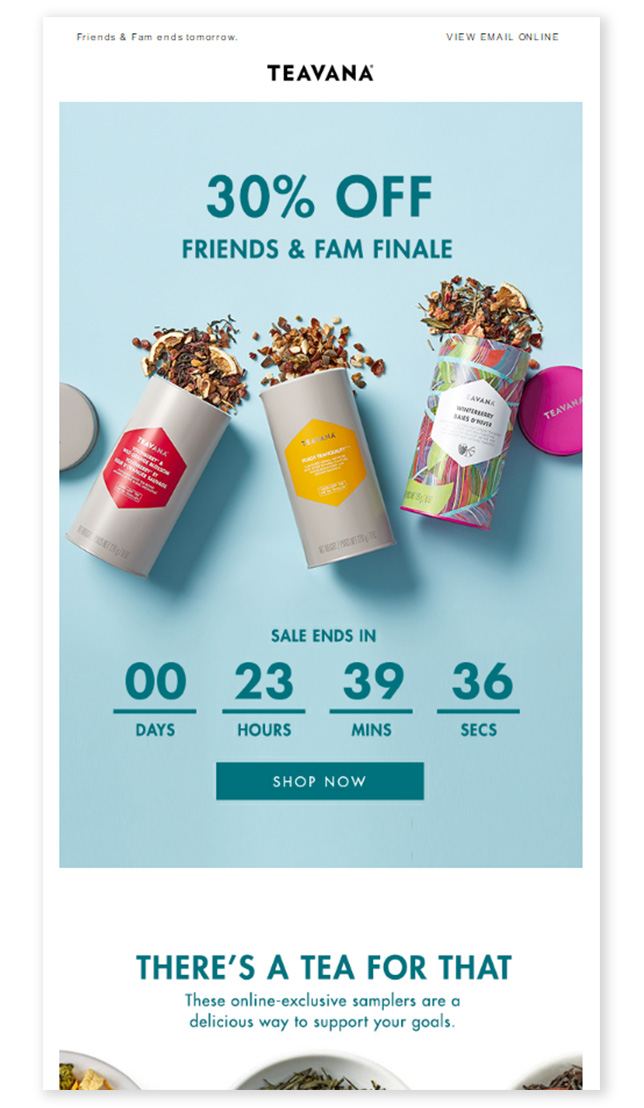
4. Free delivery and/or freebie
No one can resist a gift, however symbolic. Such being the case, promising a freebie, a free product or service, is a great way to speed up sales. This technique should be combined with the urgency leverage to increase its effectiveness.
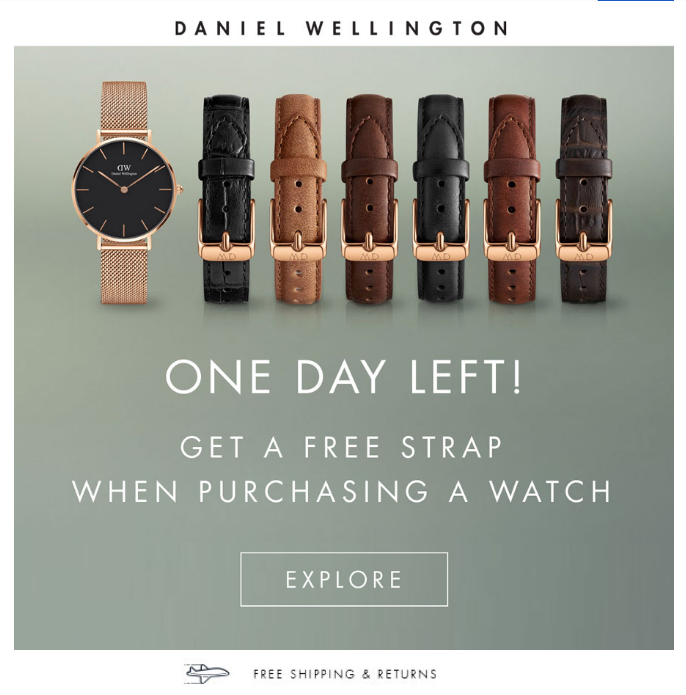
5. New products
When you introduce a new product or a new collection, communicate it via email. It is worth slightly stressing emphasis in the message, accompanying an eye-catching graphic with explanatory text and a call-to-action that leads to the discovery of the new items.
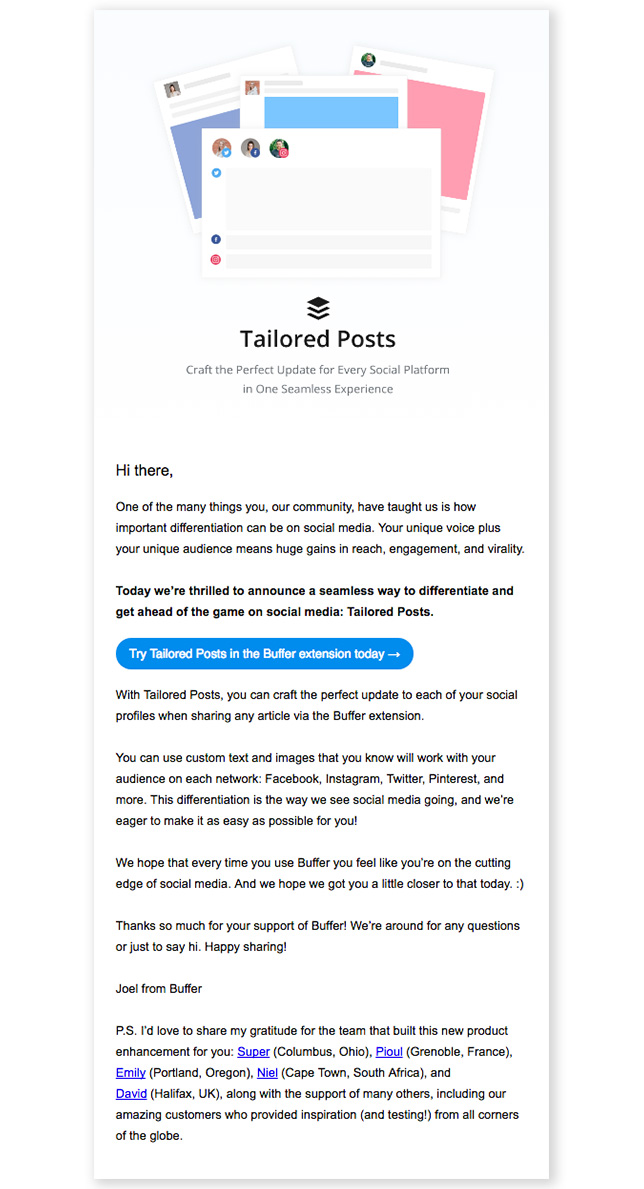
6. Contest
To increase the volumes of traffic to the site and, ultimately, make conversions, a strategy based around a contest can prove very effective. The benefit of participating in the competition acts as a more than compelling counterpart for those who decide to sign up.
Therefore, investing energy and resources (also read – money) in a contest activity during periods of low traffic can be very useful for boosting site trends and improving engagement.
Bonus idea: link the contest to the purchase of a product, in order to promote conversions as well as traffic and engagement.
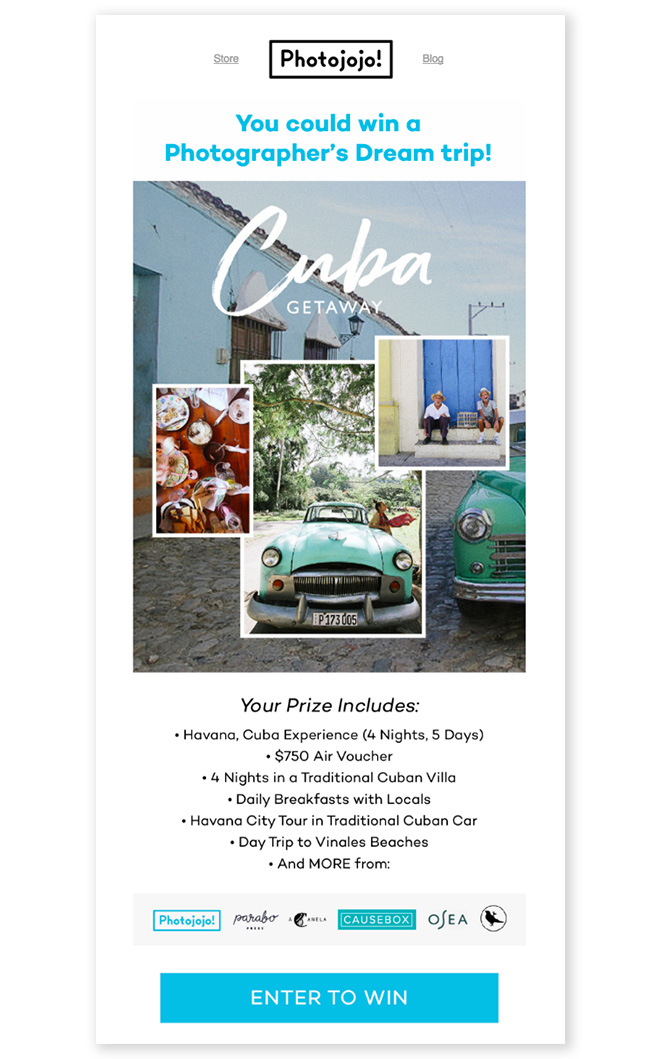
7. Mysterious offer
Curiosity killed the cat, as the old saying goes. There is no doubt that curiosity provides a stimulus to action that should not be overlooked. To incite readers to click, why not play on the mystery and propose a special offer that they can only find out about by clicking through on the email? Interactivity + curiosity + savings: the winning combination.
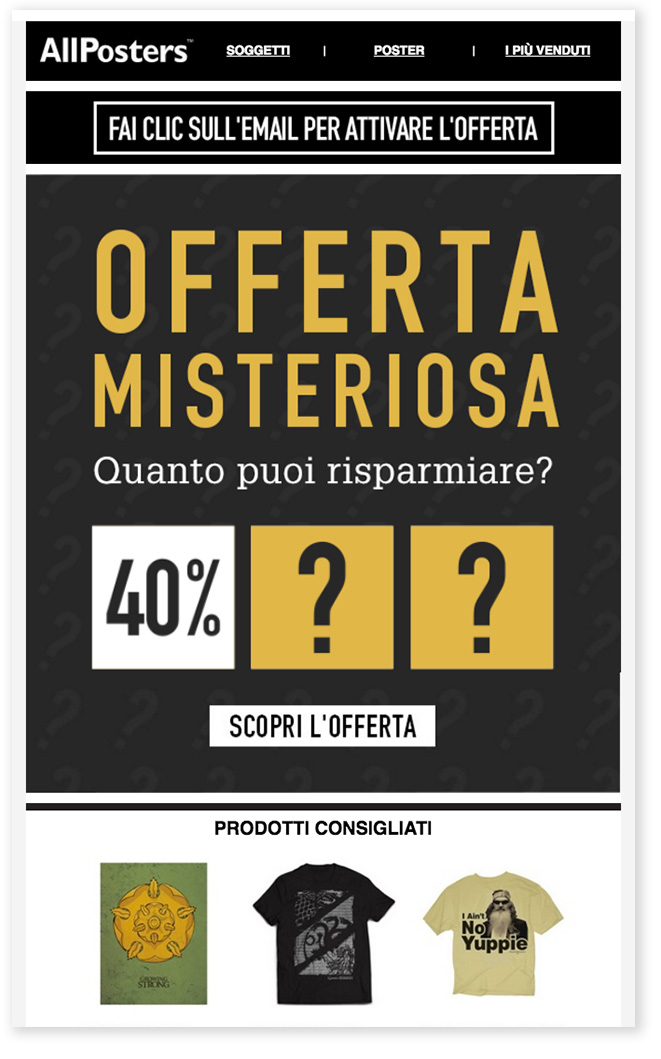
8. Newsjacking
Newsjacking is the marketing technique that takes advantage of current events, using them as a “hook” for presenting products or services. An example? The advertising campaign by Norwegian Air when Angelina Jolie and Brad Pitt announced their separation.
This technique is also perfect in emails: here are two examples related to national Cat Day. It’s an infallible way to win over cat lovers, and not only!
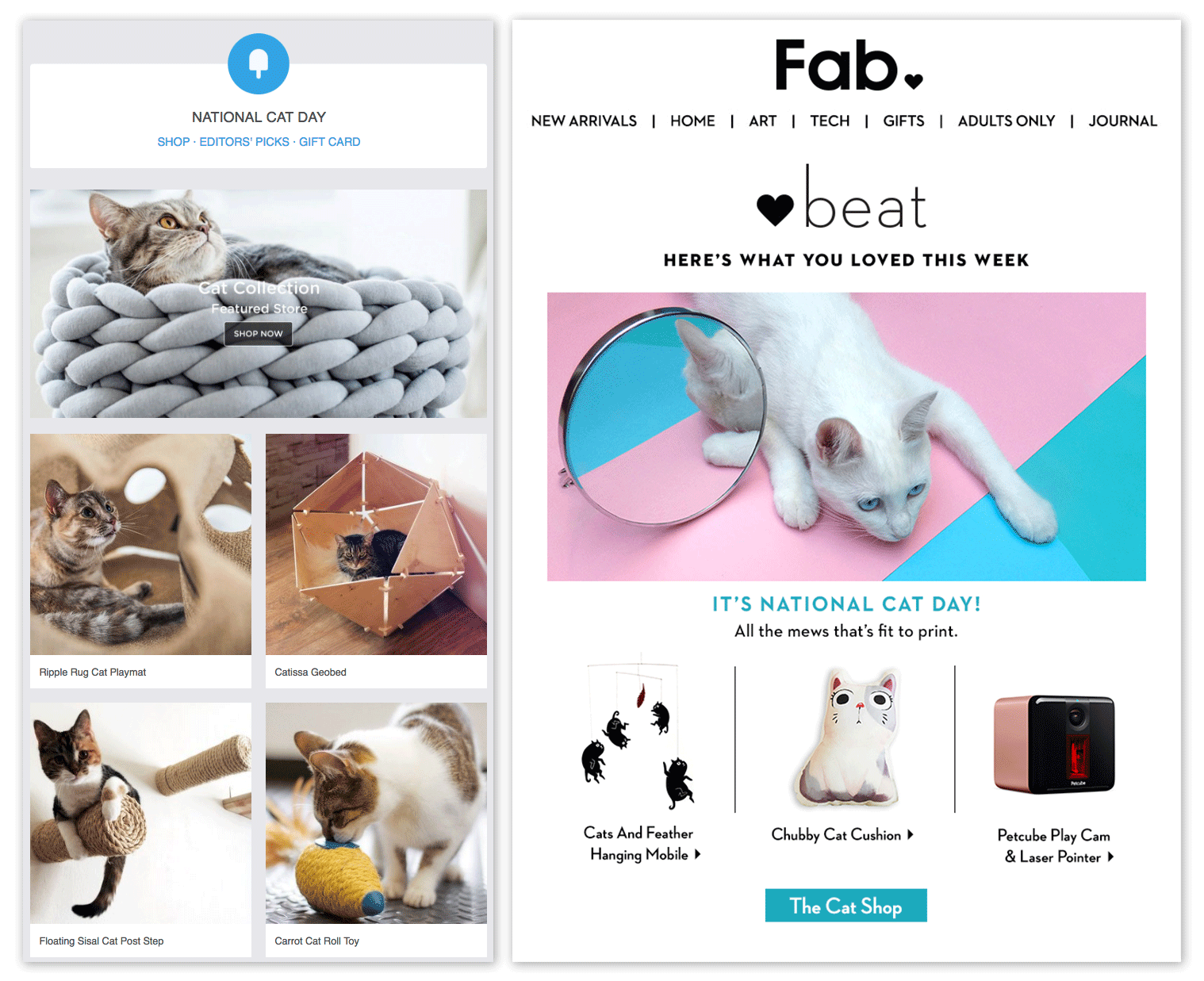
Wrap up
The universe of promotional emails is much broader than the classic “Discount Discount Discounts” communications. When shaping your campaign, always remember these points:
- Affordability is a powerful lever, but it is not the only one. Experiment with other forms of communication to present the same product.
- Always bear in mind the type of relationship you want to build with your readers. Do not bore them, do not be intrusive and do not be repetitive.
- To optimize conversions, experiment with formats, copy, calls-to-action and images.
- Segment your audience and send each cluster the most relevant offer.
To get started on you promotional email campaign right now, try MailUp with a free 30-day trial!

From developing integrations to strategic support, from creating creative concepts to optimizing results.